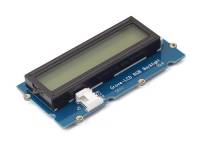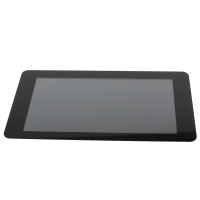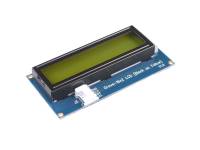Buy LCD - Display for Microcontroller
A Liquid Crystal Display, also called LCD for short, is often used in microelectronics to display captured data series outside the development environment, for example the serial monitor of the Arduino IDE.
Since the LCDs are colloquially also called LCD display, we use the "wrong" designation in the following for a simpler understanding.
The technical background of an LCD display is as simple as ingenious: On the display there are usually between 16 and 20 segments, which are displayed in two to four rows, depending on the version. The corresponding displays are therefore often referred to as 1602 LCD or 2004 LCD depending on the version. Within these segments are liquid crystals (hence the term "liquid crystal"), which arrange themselves when voltage is applied so that the desired digit appears.
Different forms of LCD displays
We distinguish between two different versions of LCD displays for microcontrollers. These versions are versions with a parallel bus system and versions with a serial bus system, also called I2C. Both versions are usually shipped from the factory with the Hitachi HD44780 chip or a compatible version.
The advantage of the serial bus system over the parallel bus is mainly the simplified cabling. While LCD displays with a parallel bus system have to be connected with 14 or 16 cables to a microcontroller, only four cables are sufficient for a display with a serial bus system.
We always recommend especially beginners to use Displays with I2C bus. The reduction of the required cables on a breadboard from 14/16 to 4 cables simplifies the handling of the displays enormously and also saves the project visually.
Practical tips for using an LCD display for microcontrollers
Most product specific customer inquiries reach us for the use of LCD displays with serial interface (I2C bus). Therefore we would like to go into more detail on a number of hints which might be helpful for you when using the display.
The backlight of the LCD does not work
This can have two possible causes: Either you did not turn on the backlight in the code ("lcd.backlight();" or "lcd.noBacklight();") or the jumper on the back of the display is not seated properly.
The LCD display does not show any text
Often the contrast of the display is not set correctly at delivery. You can change this setting by turning the trim potentiometer on the LCD display Trimming potentiometer located on the LCD display.
The text displayed on the LCD does not match my code
If your display shows cryptic characters, the error is in most cases due to an incompatible library. Especially for serial LCD displays you can find a lot of libraries with identical names. This is usually "LiquidCrystal_I2C.h". Not all libraries with this name use identical functions. We always use the library "LiquiCrystal_I2C.h" from Mr. Frank de Brabander in our free manuals.
Another possible cause could be the control via a wrong HEX address. The LCD displays with serial interface are delivered ex factory with two different HEX addresses. These are "0x27" or "0x3F" and must be numbered accordingly within the code.
Which HEX address your display has can be read out with the code of our manual "Two I2C Displays".







